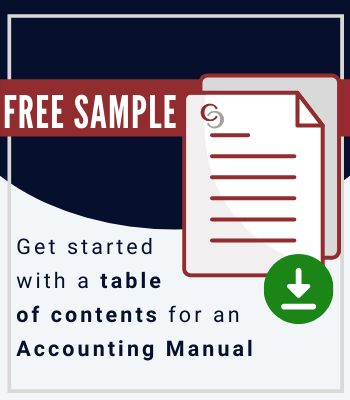Accounting manuals are key to any organization, regardless of the type. Although the task of creating an accounting manual might seem daunting, it is a worthwhile endeavor. This blog post will explore the benefits and identify the key components of an accounting manual and as an added bonus you can download a typical table of contents of an accounting manual.
The benefits of having an Accounting Manual include:
- Ensuring compliance through the consistent application of policies and procedures. The Accounting Manual serves as a reference for your internal staff and leadership, reinforcing requirements and best practices.
- Reducing the risk of fraud. The internal controls, policies, and procedures outlined in an Accounting Manual are designed to minimize the possibility of financial malfeasance as well as potential liability for the CEO and the Board of Directors.
- Satisfying regulatory and audit requirements. Auditors and the IRS Form 990 require that you have an Accounting Manual in place.
- Efficiency in employee training. Accounting manuals can be a key tool in training new employees and clarifying the organization’s many roles and responsibilities. Becoming familiar with these will not only help new employees but can also clarify uncertainties that might arise.
- Enabling your staff and Board to work more efficiently. With a comprehensive Accounting Manual, the answers to many accounting and finance questions are at your fingertips so you do not waste valuable time reinventing the wheel each time an issue arises.
It is important to note that an Accounting Manual is not comprised of ongoing standard operating procedures (SOPs.) SOPs should be developed separately from the Accounting Manual and revised as ongoing procedures change. An Accounting Manual (which should be updated annually and approved by an Audit or Finance Committee prior to being approved by the Board) documents high-level policies, information, and guidance including:
- An overview of the organization and its entities
- General ledger accounts and definitions
- Internal controls
- Asset management guidelines
- Accounting policies and high-level procedures
- Financial statement processing guidelines
- Accounting policies
- Government reporting and tax returns
- Budget processes and roles
- Assurance and risk management
- Reference to (or inclusion of) whistleblower, conflict of interest, and record retention policies
Accounting Manuals are a key component to effectively managing the accounting and finance function of a nonprofit. Accounting manuals also provide direction that is critical to decision-making processes, understanding organizational roles and policies, and consistently operating in a compliant manner.
Have questions or would like to discuss how we may be able to help?
By downloading this resource you authorize Chazin to send you marketing related emails. We will never sell your information to any third parties. You can unsubscribe at any time by clicking the unsubscribe link in the footer of our emails.

Share This Post:

Chazin
With over 20 years working exclusively with nonprofits, we pride ourselves in having a unique understanding of nonprofit accounting needs. We believe that nonprofits deserve personalized, quality service and should not settle for a one-size-fits-all approach. We collaborate with you to provide a fully virtual and customized solution that is not only cost-effective but also strengthens your accounting function. We offer a team of industry experts at your disposal to provide advice, leading technology, and to supplement existing staff to improve efficiency and compliance.